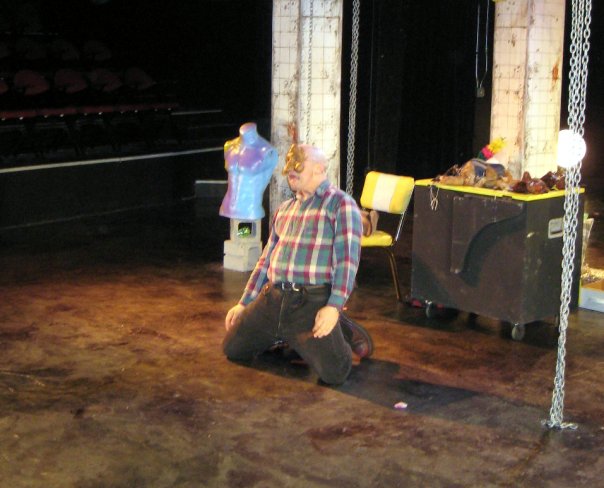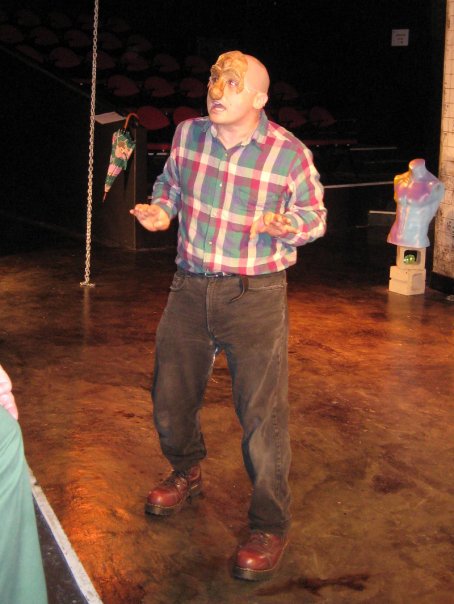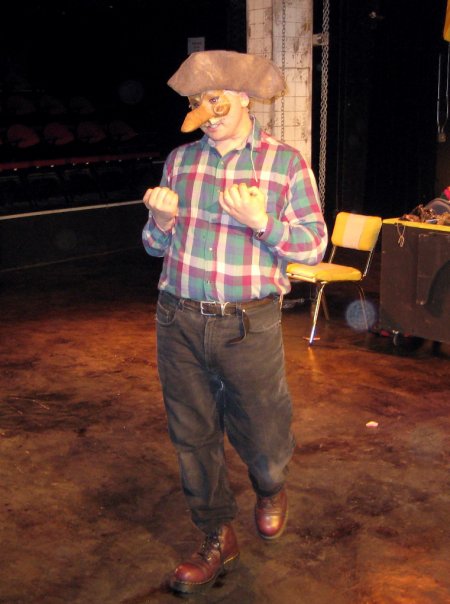[Yes, it was nearly two months ago, but I as mentioned before, blogging takes a back seat to the passing of a beloved cat.]
On February 25th, I gave a presentation for World Commedia dell'Arte Day after Orfeo Group Theatre's production of Pierre Marivaux' The Island of Slaves. I packed my masks, along with three that were loaned to me by Eric Bornstein of Behind the Mask. Eric had been invited to present, but had a prior commitment so he recommended me to go in his place (thanks, Eric!)
Judith Chaffee (visit her Commedia dell'Arte Website) was also scheduled to present, but was unable to make it. So it was up to me. Thankfully, between performing and teaching, I've gotten quite a few ideas about what commedia means to me.
Besides introducing some of the masks, I also demonstrated some of the physical postures of the characters. Photographs courtesy of Cherie Konyha Greene unless otherwise noted. To quote Cherie: "I'd have liked to get more shots of Ian's Arlecchino--but he moves too fast for my camera. As an Arlecchino should."
To quote Cherie: "I'd have liked to get more shots of Ian's Arlecchino--but he moves too fast for my camera. As an Arlecchino should." Il Dottore has a someone different approach to filling his belly than Arlecchino.
Il Dottore has a someone different approach to filling his belly than Arlecchino. Il Capitano, by contrast, is seeking to fill something else, or as he said to one audience member: "This is not rain. It is the angels weeping because I have forsaken them for you."
Il Capitano, by contrast, is seeking to fill something else, or as he said to one audience member: "This is not rain. It is the angels weeping because I have forsaken them for you." The red mask at center is Eric Bornstein's interpretation of Il Capitano. Eric did this mask in leather, mine is in papier-mâché.
The red mask at center is Eric Bornstein's interpretation of Il Capitano. Eric did this mask in leather, mine is in papier-mâché. Amanda J. Collins, who had been playing Cleanthis earlier in the evening, wearing one of Eric's Arlecchino masks. This one is in leather.
Amanda J. Collins, who had been playing Cleanthis earlier in the evening, wearing one of Eric's Arlecchino masks. This one is in leather. Once again, as Il Capitano. Photo courtesy of Orfeo Group.
Once again, as Il Capitano. Photo courtesy of Orfeo Group.
Photostream (including more photos) starts here
In addition to Orfeo and Behind the mask, I want to thank Associazione SAT and Faction of Fools for declaring and organizing World Commedia dell'Arte Day!
Tuesday, April 20, 2010
Belated Photographs from Commedia dell'Arte Day Presentation
Posted by
Ian Thal
at
1:22 PM
0
comments
![]()
![]()
Labels: Amanda J. Collins, Associazione SAT, Behind the Mask, Cherie Konyha Greene, commedia dell'arte, Eric Bornstein, Faction of Fools, Orfeo Group
Saturday, April 3, 2010
Belated Post-Reading Report
The March 28th reading was as rewarding as was stressful. As with the previous reading in October, I had had a few roles to recast, but I was also still dealing with the loss of my cat, Omi, who had been my companion for some 16 years. Grief has a way of putting one off schedule.
Then, as my plans finally came together with roles being cast only days before the reading, more chaos ensued. Stage manager Anika Hannibal-Colvin, who had been a valued assistant in the previous two readings fell ill, and Dan Schneider had an emergency to deal with on the day of the show. I was able to appoint Trudi Goodman to be stage manager since she she was reading a minor role that was only needed for a single scene, and she appointed me the understudy and so, I played the role of Jonah, especially strange since my plan was to sit in the back of the room and take notes.
The talk-back after the reading was particularly helpful. Both Thomas Garvey and Art Hennessey were in the audience and had a lot of useful observations as to how the dramatic potential could be better exploited (Art promised me some notes!) A recurring issue with the current draft as I would see with the feedback was that many dramatic turns near the end were left to inuendo, and not made explicit and therefore missed by the audience. In situations like that, it's the playwright, not the audience who is at fault.
As most of my actors were returnees, they seemed more comfortable than before in speaking candidly with me about both the performances and the script (both in terms of the current draft and the over all development)-- something which has continued in email conversations over the following couple of days in which I had superb dialogue with several cast members. I found myself in one exchange citing Adam Szymkowicz' recent interview of playwright Paul Mullin, when asked for advice to playwrights, Mullin said:
Understand the tradition you have joined. Never cede your place in the hierarchy. Directors did not come into existence until the 19th Century. Artistic directors not until the 20th. Only actors outrank you in seniority in the tradition. So treat them with respect. In fact, act on stage as often as you can...Very good advice, I think.
The following day I received a letter in the post from a literary director, who after reading a ten-page sample was soliciting the full length script. Obviously, I can't name names since no commitment has been made, but sometimes the reward for hard work is simply to be encouraged to go back to work.
Posted by
Ian Thal
at
6:25 AM
2
comments
![]()
![]()
Labels: acting, Adam Szymkowicz, Art Hennessey, Paul Mullin, theatre, thomas garvey, total war, writing


